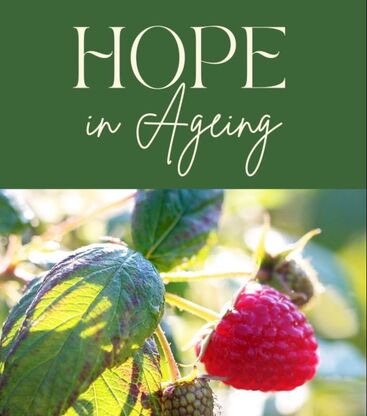Unleash your Creativity!
Does the thought of ageing bring a smile to your face or a frown to your brow? Many people view ageing negatively, yet it is a universally experienced privilege for those of us with breath still in our lungs.
We believe there is much joy to experience in growing older. To showcase the vibrant potential of this life stage, we are thrilled to announce JOY IN AGEING: a dynamic competition celebrating the joys of ageing through poetry, art and multimedia.
We invite you to capture the essence of ageing in its most joyful forms. We believe this Joy in Ageing competition will serve as a powerful reminder that ageing is a journey filled with laughter, love, and continued discovery. Share your voice, unleash your creativity, and help us rewrite the narrative on ageing – one brushstroke and verse at a time.
The competition opens on 1st February 2024 to anyone aged over 50. Of course, we’re all ageing from the day we’re born until the day we die, but they want to hear from those in the second half of life.
The closing date is 30th April 2024, and entries can be submitted by post or email.
Click on the link below or scroll down for full competition guidelines and details of where the poems should be submitted.
Shortlisted poems and artwork will be published in an anthology to celebrate International Older Peoples Day on the 1st October 2024.
We believe there is much joy to experience in growing older. To showcase the vibrant potential of this life stage, we are thrilled to announce JOY IN AGEING: a dynamic competition celebrating the joys of ageing through poetry, art and multimedia.
We invite you to capture the essence of ageing in its most joyful forms. We believe this Joy in Ageing competition will serve as a powerful reminder that ageing is a journey filled with laughter, love, and continued discovery. Share your voice, unleash your creativity, and help us rewrite the narrative on ageing – one brushstroke and verse at a time.
The competition opens on 1st February 2024 to anyone aged over 50. Of course, we’re all ageing from the day we’re born until the day we die, but they want to hear from those in the second half of life.
The closing date is 30th April 2024, and entries can be submitted by post or email.
Click on the link below or scroll down for full competition guidelines and details of where the poems should be submitted.
Shortlisted poems and artwork will be published in an anthology to celebrate International Older Peoples Day on the 1st October 2024.
Competition Guidelines
General Rules
1.The competition opens on 1st February 2024 to anyone aged 50 or over, living in the UK.
2. The closing date is midnight on 30th April 2024. Entries received after this time will not be considered.
3. Up to 3 entries can be made per person in total.
4. Under no circumstances can alterations be made to entries once entered.
5. Only entries that stick to the guidelines below will be permitted.
6. All entries must be on the theme of Joy in Ageing and be the entrant’s original work.
7. Entries must not have been published, self-published, published on a website or made public on social
media, broadcast or featured among the winners in another competition before 30th April 2024.
2. The closing date is midnight on 30th April 2024. Entries received after this time will not be considered.
3. Up to 3 entries can be made per person in total.
4. Under no circumstances can alterations be made to entries once entered.
5. Only entries that stick to the guidelines below will be permitted.
6. All entries must be on the theme of Joy in Ageing and be the entrant’s original work.
7. Entries must not have been published, self-published, published on a website or made public on social
media, broadcast or featured among the winners in another competition before 30th April 2024.
Poem Guidelines
All poems must have a title and be in English, and must not exceed 40 lines in length (excluding title).
Art Guidelines
Submissions must be in the form of graphic 2D static artwork, including painting, drawing, pen & ink, etc.
Please submit a clear image of your artwork which includes an object to give a sense of scale.
Please submit a clear image of your artwork which includes an object to give a sense of scale.
Multimedia Guidelines
Multi media includes photos and videos. The maximum length of a video must be 1 minute.
All photos and videos submitted must not infringe the rights of any other person. Embracing Age cannot
be liable if another person’s rights are breached. It is the responsibility of the entrant to obtain consent
before taking and submitting photos and videos showing other people.
All photos and videos submitted must not infringe the rights of any other person. Embracing Age cannot
be liable if another person’s rights are breached. It is the responsibility of the entrant to obtain consent
before taking and submitting photos and videos showing other people.
How to Enter
Entries should either be emailed to [email protected] or posted to Joy in Ageing Competition,
Embracing Age, ETNA Community Centre, 13 Rosslyn Road, Twickenham, TW1 2AR.
Entries will not be returned, so please keep a copy.
For art submissions, please send a high quality image of the art work rather than the original.
Please include your name, age and contact details.
Telephone or email confirmation of receipt is not available.
The judges decision is final. Neither the judges nor staff will enter into any correspondence.
No current employee or Trustee of Embracing Age is eligible to enter the Competition.
Embracing Age, ETNA Community Centre, 13 Rosslyn Road, Twickenham, TW1 2AR.
Entries will not be returned, so please keep a copy.
For art submissions, please send a high quality image of the art work rather than the original.
Please include your name, age and contact details.
Telephone or email confirmation of receipt is not available.
The judges decision is final. Neither the judges nor staff will enter into any correspondence.
No current employee or Trustee of Embracing Age is eligible to enter the Competition.
Winners
1. Winners and shortlisted entries will be notified by the end of July 2024 and the winners will be
announced on the Embracing Age website. All winners will be asked to provide a biography and
photograph which will be used in publicity.
2. The copyright of each entry remains with the author. However, authors of the winning entries, by
entering the competition, grant Embracing Age the right in perpetuity to publish and/or broadcast their
work. Use of the winning entries elsewhere for one year from 2024 is subject to permission from
Embracing Age
3.Shortlisted entries will be published in an anthology which will be available to purchase.
announced on the Embracing Age website. All winners will be asked to provide a biography and
photograph which will be used in publicity.
2. The copyright of each entry remains with the author. However, authors of the winning entries, by
entering the competition, grant Embracing Age the right in perpetuity to publish and/or broadcast their
work. Use of the winning entries elsewhere for one year from 2024 is subject to permission from
Embracing Age
3.Shortlisted entries will be published in an anthology which will be available to purchase.
The Small Print
Entrants agree to indemnify the judges, organisers, and any other related parties against any litigation that
may arise should the entries not have the necessary permission to be published. We reserve the right to
update & amend these rules at any time, but only if necessary; any changes will be posted on this website.
may arise should the entries not have the necessary permission to be published. We reserve the right to
update & amend these rules at any time, but only if necessary; any changes will be posted on this website.
Meet the Judges
We are delighted to introduce you to our poetry and art judges for 2024
Poetry Judges
PAM RHODESFor more than three decades, Pam has been the familiar face of BBC Television’s ‘SONGS OF PRAISE’, presenting programmes from tiny country churches to huge outside broadcasts. She’s met a wide range of people from Pope John Paul II to Dolly Parton - but her heart is in the sensitive interviews for which she’s well-known, as she encourages those she meets to share their stories.
|
DAVE BILBROUGHA troubadour of grace, Dave carries five decades of experience in the worship arena. Abba Father, All Hail the Lamb, I am a New Creation and Let there be Love are just some of his songs that have been sung worldwide by Christians of all denominations. Alongside his music he is in regular demand as a seminar speaker on things related to worship. As an award-winning artist, he has embraced various diverse musical styles on his journey and has a passion to see innovative expressions of creativity across the creative arts.
|
ANDREW PRATTAndrew was born in a small guest house within four hundred yards of the sea in Paignton in Devon.
|
Art Judges
PAUL HOBBSPaul Hobbs makes painting and sculpture that consider contemporary social issues in the light of biblical values.
|
KARINA PHILLIPSAs Director and Owner of Gallery Different, situated in the heart of London’s West End, Karina has the pleasure of working with artists from all over the world and curating a changing schedule of exhibitions throughout the year. The art shown is of the finest quality and by artists in whom the gallery has a strong belief. They range from established internationally renowned artists to young emerging talent. She has over 25 years’ experience in representing, exhibiting, and selling the work of the gallery’s artists both in the gallery and at art fairs throughout the UK.
|
ROGER WAGNERRoger read English at Oxford University before studying at the Royal Academy School of Art. He has produced several books of illustrated poems and translations, including Fire Sonnets (1984), In a Strange Land (1988), and The Nearer You Stand (2019). He has also produced three Books of Praises - translations of the Psalms.
|
MultiMedia Judges
The multimedia entries will be judged by our team at Embracing Age.
Last Year's WinnersRead the winning poems from last year's Hope in Ageing competition
|
|
Reg. Charity No. 1160400
© 2024 Embracing Age
|
Quick Links |








